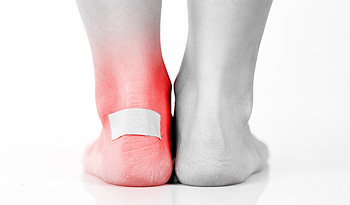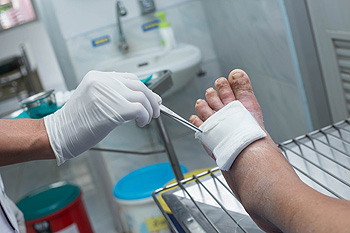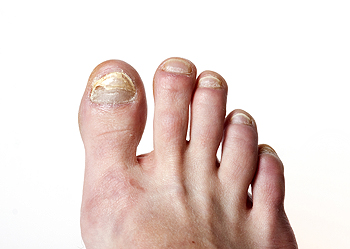Blog
The Amazing Healing Powers of a Blister
While blisters are uncomfortable and inconvenient, they are a fairly remarkable protective and healing mechanism of the body. When shoes cause friction against the feet or toes, layers of skin below the top layer—known as the stratum spinosum—can sometimes become detached from the tissue below. Surrounding cells leak fluid into this separation and a blister is formed. This blister, and the fluid within it, helps stop damage to the skin from continuing and deepening, and also prevents an infection from developing. Hours after the blister has formed, cells underneath it gather amino acids and nucleosides and the healing process is well underway. These cells regenerate, divide and create new layers of skin, as fluid is absorbed back into the body and swelling lessens. If you develop a blister, do not pop it. Cover it with a bandage to allow it to do its magic and heal on its own. If the blister becomes red, full of puss, foul-smelling, or you develop a fever, it may be infected and need the care of a podiatrist.
Blisters may appear as a single bubble or in a cluster. They can cause a lot of pain and may be filled with pus, blood, or watery serum. If your feet are hurting, contact one of our podiatrists of Pennsylvania. Our doctors can provide the care you need to keep you pain-free and on your feet.
Foot Blisters
Foot blisters are often the result of friction. This happens due to the constant rubbing from shoes, which can lead to pain.
What Are Foot Blisters?
A foot blister is a small fluid-filled pocket that forms on the upper-most layer of the skin. Blisters are filled with clear fluid and can lead to blood drainage or pus if the area becomes infected.
Symptoms
(Blister symptoms may vary depending on what is causing them)
- Bubble of skin filled with fluid
- Redness
- Moderate to severe pain
- Itching
Prevention & Treatment
In order to prevent blisters, you should be sure to wear comfortable shoes with socks that cushion your feet and absorb sweat. Breaking a blister open may increase your chances of developing an infection. However, if your blister breaks, you should wash the area with soap and water immediately and then apply a bandage to the affected area. If your blisters cause severe pain it is important that you call your podiatrist right away.
If you have any questions, please feel free to contact one of our offices located in Plymouth Meeting and Ambler, PA . We offer the newest diagnostic and treatment technologies for all your foot care needs.
Being Proactive About Diabetic Ulcers
Foot ulcers are something that every person with diabetes should be vigilant about. Because of poor circulation, neuropathy and other factors precipitated by diabetes, any cut or abrasion on the foot of a diabetic—particularly on the bottom of the foot—has the potential to become a diabetic ulcer. Through daily foot inspections and prompt visits to the podiatrist should the slightest break in skin appear, many wounds may be prevented from developing. If a lesion on the foot is not detected early enough and it progresses into a wound, a podiatrist will try to heal it or manage it to prevent it from worsening. When a diabetic ulcer does not heal, deepens, gets infected, or begins to damage surrounding tissue, advanced care is vital. A podiatrist can help keep the wound sterilized and use advanced techniques such as debridement to remove dead tissue in order to protect healthy tissue and salvage the limb. If you are in need of diabetic foot care, or want to be proactive about diabetic ulcers, schedule an appointment with a podiatrist as soon as possible.
Diabetic foot care is important in preventing foot ailments such as ulcers. If you are suffering from diabetes or have any other concerns about your feet, contact one of our podiatrists from Pennsylvania. Our doctors can provide the care you need to keep you pain-free and on your feet.
Diabetic Foot Care
Diabetes affects millions of people every year. The condition can damage blood vessels in many parts of the body, especially the feet. Because of this, taking care of your feet is essential if you have diabetes, and having a podiatrist help monitor your foot health is highly recommended.
The Importance of Caring for Your Feet
- Routinely inspect your feet for bruises or sores.
- Wear socks that fit your feet comfortably.
- Wear comfortable shoes that provide adequate support.
Patients with diabetes should have their doctor monitor their blood levels, as blood sugar levels play such a huge role in diabetic care. Monitoring these levels on a regular basis is highly advised.
It is always best to inform your healthcare professional of any concerns you may have regarding your feet, especially for diabetic patients. Early treatment and routine foot examinations are keys to maintaining proper health, especially because severe complications can arise if proper treatment is not applied.
If you have any questions please feel free to contact one of our offices located in Plymouth Meeting and Ambler, PA . We offer the newest diagnostic and treatment technologies for all your foot and ankle needs.
Toenail Fungus and Dietary Habits
The medical condition known as toenail fungus is often noticed by discoloration of the toenails. The nail may appear to be thick and yellow, and in severe cases sometimes the nail may become brittle and fall off. Some patients find it helpful to incorporate anti-fungal foods as part of their daily eating habits. Research has suggested it may be beneficial to eat foods that are made with specific ingredients and oils that may improve the quality of the bacteria in the gut. Some of the foods that may help to keep the body healthy can include fresh vegetables, chicken, and fish. Eating these types of foods may be instrumental in improving the immune system and are often considered when beginning treatment for toenail fungus. If you are afflicted with this ailment or have recurring fungal toenails, it is suggested that you consult with a podiatrist as quickly as possible who can determine what the best treatment methods are for you.
If left untreated, toenail fungus may spread to other toenails, skin, or even fingernails. If you suspect you have toenail fungus it is important to seek treatment right away. For more information about treatment, contact one of our podiatrists of Pennsylvania. Our doctors can provide the care you need to keep you pain-free and on your feet.
Symptoms
- Warped or oddly shaped nails
- Yellowish nails
- Loose/separated nail
- Buildup of bits and pieces of nail fragments under the nail
- Brittle, broken, thickened nail
Treatment
If self-care strategies and over-the-counter medications does not help your fungus, your podiatrist may give you a prescription drug instead. Even if you find relief from your toenail fungus symptoms, you may experience a repeat infection in the future.
Prevention
In order to prevent getting toenail fungus in the future, you should always make sure to wash your feet with soap and water. After washing, it is important to dry your feet thoroughly especially in between the toes. When trimming your toenails, be sure to trim straight across instead of in a rounded shape. It is crucial not to cover up discolored nails with nail polish because that will prevent your nail from being able to “breathe”.
In some cases, surgical procedure may be needed to remove the toenail fungus. Consult with your podiatrist about the best treatment options for your case of toenail fungus.
If you have any questions, please feel free to contact one of our offices located in Plymouth Meeting and Ambler, PA . We offer the newest diagnostic and treatment technologies for all your foot care needs.
What Is Achilles Tendonitis?
 The large tendon on the back of the ankle which connects the calf muscles to the heel bone is known as the Achilles tendon. When this tendon becomes inflamed or degenerates, Achilles tendonitis can occur, which is also referred to as Achilles tendinopathy. This type of injury usually occurs due to overuse. Common factors that can contribute to the development of this condition may include poor foot biomechanics, improper footwear, wearing high heels, and over training. Patients who are noticing pain, stiffness, or tenderness in their Achilles tendon should consult with a podiatrist as soon as possible since Achilles tendonitis is easier to treat when diagnosed early.
The large tendon on the back of the ankle which connects the calf muscles to the heel bone is known as the Achilles tendon. When this tendon becomes inflamed or degenerates, Achilles tendonitis can occur, which is also referred to as Achilles tendinopathy. This type of injury usually occurs due to overuse. Common factors that can contribute to the development of this condition may include poor foot biomechanics, improper footwear, wearing high heels, and over training. Patients who are noticing pain, stiffness, or tenderness in their Achilles tendon should consult with a podiatrist as soon as possible since Achilles tendonitis is easier to treat when diagnosed early.
Achilles tendon injuries need immediate attention to avoid future complications. If you have any concerns, contact one of our podiatrists of Pennsylvania. Our doctors can provide the care you need to keep you pain-free and on your feet.
What Is the Achilles Tendon?
The Achilles tendon is a tendon that connects the lower leg muscles and calf to the heel of the foot. It is the strongest tendon in the human body and is essential for making movement possible. Because this tendon is such an integral part of the body, any injuries to it can create immense difficulties and should immediately be presented to a doctor.
What Are the Symptoms of an Achilles Tendon Injury?
There are various types of injuries that can affect the Achilles tendon. The two most common injuries are Achilles tendinitis and ruptures of the tendon.
Achilles Tendinitis Symptoms
- Inflammation
- Dull to severe pain
- Increased blood flow to the tendon
- Thickening of the tendon
Rupture Symptoms
- Extreme pain and swelling in the foot
- Total immobility
Treatment and Prevention
Achilles tendon injuries are diagnosed by a thorough physical evaluation, which can include an MRI. Treatment involves rest, physical therapy, and in some cases, surgery. However, various preventative measures can be taken to avoid these injuries, such as:
- Thorough stretching of the tendon before and after exercise
- Strengthening exercises like calf raises, squats, leg curls, leg extensions, leg raises, lunges, and leg presses
If you have any questions please feel free to contact one of our offices located in Plymouth Meeting and Ambler, PA . We offer the newest diagnostic tools and technology to treat your foot and ankle needs.



